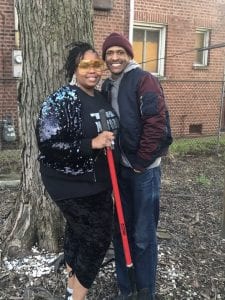At the core of the Farm-to-Consumer Legal Defense Fund’s (FTCLDF) mission is protecting the right to produce and access farm-fresh foods. In a recent case that is gaining national attention, one FTCLDF member’s right to provide food for her family is in jeopardy. 
The Urban Farm
Aja Yasir and her husband, Yasir Allah, grow hundreds of varieties of medicinal herbs, fruits, and vegetables at their home in Gary, Indiana. Practicing regenerative agriculture, Aja and her husband bring color and nutrition to an area of Indiana that struggles to provide enough food for its community. “Just because this is a food-producing place doesn’t mean it can’t be beautiful,” Aja said.
Aja’s property is zoned both residential and agricultural, and to the untrained eye might not look like a typical farm. In the front of her yard, the sun illuminates the garden, “Rose for Yaminah,” named for her infant daughter who passed in 2016. The garden is home to several plants and vegetables, including many heirloom varieties and medicinal herbs. In the shadier backyard, Aja is installing a home orchard, grapevines, and a vineyard. Aja uses the winter sowing method to start seeds in January and February using recycled water jugs. During a recent phone call, Aja said, “if you don’t know what we’re doing it just looks like a bunch of milk jugs.”
Small-Scale Regenerative Agriculture
She also uses wood chips as a method to rebuild the soil, a practice of regenerative agriculture that focuses on using organic material to produce food. Regenerative agriculture is a set of farming practices that rebuilds soil and restores degraded soil biodiversity. The benefits of regenerative agriculture include capturing carbon from the atmosphere, reversing climate change, and improving the water cycle. Gary, Indiana is built on sand and is not efficient at capturing rainwater. Aja uses readily available materials in the area like wood chips, leaves, rainwater, and seaweed to rebuild the soil. She has received citations in the past regarding the use of wood chips. The city claims the wood chips are debris and must be removed. Aja received another code violation this year because of complaints that her gardening practices are still causing a nuisance.
Aja and Yasir are practicing a fundamental right, one that is continuously under threat, by growing food. Furthermore, they are providing food for themselves in a city that has been deemed a food desert. Aja travels at least thirty minutes to visit a grocery store because easy access to fresh produce in Gary is nonexistent.
The Hearings
On April 22, Earth Day of all days, Aja attended a hearing for violating a municipal nuisance ordinance. FTCLDF Attorney Susan Israel asked for a continuance of the hearing and plans to defend Aja in a trial opposing the nuisance citation. The court date is set for June 24 at the city’s courtroom at 555 Polk St.
Aja and FTCLDF are hoping for a positive outcome and that this case can shed a little light on the benefits of regenerative agriculture practices and urban farming. Aja would like readers to know:
“This is not just for us; it’s for other urban farmers, who may be nervous about starting a farm. I just want everyone to be left alone, to be able to grow food. It doesn’t matter what kind of community it is. Everyone should be able to grow. We should be able to grow in a regenerative manner so that it can be sustainable. We don’t have to water because of the woodchips, and the organic materials help capture the rainfall. It just looks a little different; people are afraid of different.”
Aja’s story has been picked up by The Chicago Tribune and The Associated Press. We will continue to follow this story and will update our community as we learn more.
Further Reading
A woman who transformed her Gary home’s property into an urban farm is facing some opposition
Black family fights to grow fresh food on their home’s front lawn
YOUR FUND AT WORK
Services provided by FTCLDF go beyond legal representation for members in court cases.
Educational and policy work also provide an avenue for FTCLDF to build grassroots activism to create the most favorable regulatory climate possible. In addition to advising on bill language, FTCLDF supports favorable legislation via action alerts and social media outreach.
You can protect access to real foods from small farms by becoming a member or donating today.